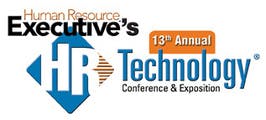Lucky that the recession ended last year, otherwise it might hard to explain all the shoppers here at the annual HR Tech show in Chicago.
I met a guy this morning at breakfast who runs the HR analytics department for a major financial institution. We talked data and he told me about the challenges of getting usable data out of multiple systems — not to mention the various ways systems allow information to be entered. Here’s here shopping for tools to help solve the problem and improve analysis.
To my left at the table was an HRIS manager for a specialty retailer with more than 12,000 employees looking at new talent management systems.
At the opening reception Tuesday night I met a team of two HR professionals who came to look at comp management systems. And on the shuttle ride to the McCormick Place convention center, an HR generalist with tech savvy said he’s at the show to scope out a new recruiting system. He won’t be looking at anything from the current vendor because, he confided, of its poor customer support.
The 13th annual HR Technology Conference & Exposition, hosted by Human Resource Executive, opened in Chicago this morning with a rousing welcome from show co-chair Bill Kutik. The HR Executive columnist exuberantly declared it the “largest HR Tech show in history.”
More of everything at this year’s HR Tech show
Spilling out statistics almost as fast as he can speak, Kutik said there were more exhibitors, multiple attendees from several companies, and attendees from multiple countries. Some 100 financial analysts and investors from Wall Street, VCs, and investment banking firms are in attendance, presumably to know more about industry trends and potential opportunities than to system shop.
Even attending was the CTO of the CIA, Kutik observed.
Two years ago, when I last attended an HR Tech show, the vendors bordered on the extravagant in their efforts to impress. Taleo had multiple booths with aerialists doing a high wire act. Workscape had a drawing for a car.
Now, as the VP of marketing for one vendor joked, “They’ve all rightsized.”
Another executive said her company decided “We wanted to focus on the value we offer.” The booth had multiple demo areas with presenters using terms like “ROI,” and “efficiencies,” and talking about “the business implications of your human capital management and how it directly contributes to productivity improvements.”
More comprehensive talent management solutions
The other trend that is full force here is the move toward comprehensive talent management solutions. StepStone, Lawson, Taleo, Kenexa, Plateau, Oracle, and the other HR tech vendors all are promoting their suites, and the efficiency of the single-vendor approach. And everything is SaaS.
Even Bond, a staffing and search firm focused tech provider, is going suite. It rolled out a vendor management system last year and an ATS a few months back. (It previously had Bond StarSearcher, which is the basis of the new Bond Talent.) Next year, it intends to roll out Bond HR, its HR admin tools. The VMS, ATS and Bond HR will form the suite.
I talked with one HR director for a regional bank who was listening in on a demo of a performance management solution. She’s been proposing a talent management system for more than a year, building a case for the need to be able to identify promising employees, know what skills the workforce has that can be tapped when the need arises, and provide development plans and regular feedback.
The bank has an ATS and other components, which are stitched together and work, “but not really as well as we know we can do.” She’s looking for a system with all the moving parts, so the bank can start with the basics and won’t have to figure out how to get everything to work together as the needs grow.
“We’re big enough that we can’t do this the way we always have,” she told me. We’re not getting the kind of results we need. The recession has been hard, but it’s also made everyone up the line realize we just have to do a better job at managing our workforce.”
